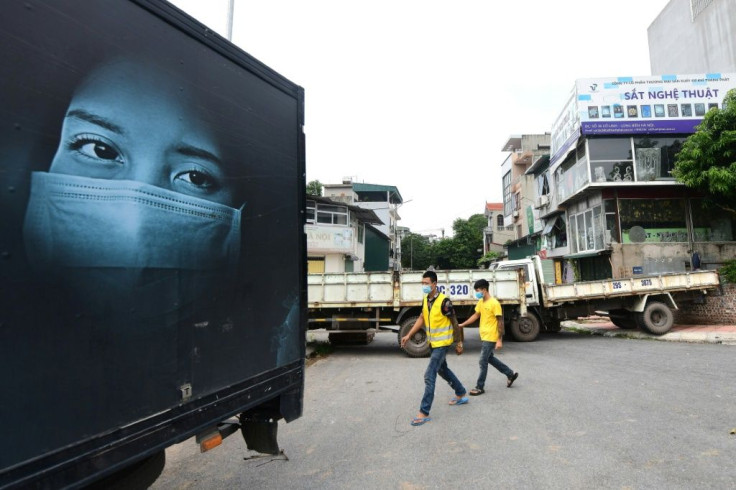Migrants Workers Flee Vietnam's Business Capital, Raising Specter Of COVID-19 Surge
KEY POINTS
- Some migrant workers spent months without work and sufficient food
- Other provinces with low vaccination fear workers' return would cause virus surge
- At least 200 people tested positive among 160,000 migrants trying to return home
A mass exodus of out-of-work migrant workers from Vietnam’s COVID-19 epicenter, Ho Chi Minh City, following an easing of restrictions has prompted fears of a virus surge in other parts of the country.
The exodus began Friday after city officials lifted the strict stay-at-home order. Some workers stuck in Ho Chi Minh City, Vietnam’s business capital, and its surrounding provinces during the lockdown have spent months without any work or sufficient food. Officials are now scrambling to track and quarantine people returning to the Mekong Delta region and the Central Highlands.
Among the 160,000 migrants returning home, at least 200 people have tested positive for COVID-19. "The sea of people returning home at this time is extremely difficult for our province to handle," Nguyen Than Binh, a local official in the Mekong Delta province of An Giang, was quoted as saying by Al Jazeera.
"For the past three days, we have worked non-stop to receive, screen, test and provide food and accommodation for people. People ride motorbikes all day and night and it rains, so those on duty have to buy raincoats for everyone."
The vaccination rate is still lagging in Vietnam as only 35% of its approximately 98 million population have received at least one dose.
After the lockdown was lifted Friday, Ho Chi Minh City’s checkpoints were flooded with people trying to get out.
"Please don't leave, and stay to work," said vice chairman of the city's People's Committee, Le Hoa Binh, according to Reuters. "The city is facing serious labor shortages."
"I'm still in debt of 40 million Vietnamese Dong ($1,762) and I have no money to buy food. 'Tell me how I can stay?' I want nothing now but to go home," said Tran Thi Thanh, who was stuck in Ho Chi Minh City during the lockdown, Al Jazeera reported.
Security forces refused to let people out without proper screening and a scuffle broke out. People broke down barriers that prevented them from leaving.
"They broke the barrier between Ho Chi Minh City and Long An Province to go home after four months of starving here," Nguyen Thao, a 32-year-old resident of Ho Chi Minh City, told Al Jazeera. "This is the first time I saw something like this. People wouldn’t be that aggressive if they were not pushed to the edge of life … I think at this time they have to break the rule to survive."
Charity workers blame the government for the chaos. According to them, the government failed to provide proper support to the migrants so that they could weather the strict restrictions.
The provinces where migrants are returning to have low vaccination rates as Vietnam has a limited vaccine supply. Even though most returnees from Ho Chi Minh City have received at least one dose, local authorities are asking returnees to isolate and pay for it.
"These inter-province emigrants still need to pay 80,000VND ($3.50) per day for seven days of quarantine if they have gotten at least one vaccine shot and for two PCR tests," said a Vietnamese economist on the condition of anonymity to Al Jazeera. Each PCR costs 700,000 Vietnamese Dong, approximately $30. Some might not be able to pay the amount.
Families after families are leaving the city after running out of money for rent and food.
The migration influx has overwhelmed the local authorities tracking returnees in the provinces of Soc Trang and Hau Giang in the Mekong Delta region. Fearing a surge in virus rate, the two provinces have asked the central government to suspend departures from Ho Chi Minh City and its surrounding. The Ca Mau province has suspended its plan to lift restrictions.
In addition to the fear of virus surge across the country, businesses in Ho Chi Minh City and its surrounding regions have been alarmed by a possible labor shortage. Easy availability of labor is crucial at a time when China’s recent power crunch due to coal shortage has manufacturers looking elsewhere in Asia to shift production.
"Some companies were on the fence about investing in China. They choose to not go ahead now," Johan Annell, partner at Asia Perspective, a consulting firm that works with Northern European companies operating in East and Southeast Asia, told CNBC.
Even though China remains the "strong destination" for manufacturers, businesses are looking at investment opportunities in Vietnam. However, the lockdown restrictions and now possible labor shortage have created a grim outlook for the country.
Last month, Vietnam’s statistics offices stated that the country's economy contracted by 6.17 percent in the third quarter, since the government was forced to put Ho Chi Minh City under a severe lockdown in July. It marks the sharpest decline since records keeping began in 2000, Financial Times reported.
According to the FT report, the business chamber representing foreign investors warned Prime Minister Pham Minh Chinh that the shutdowns have disrupted several companies’ operations, even prompting some to relocate production to other countries.

© Copyright IBTimes 2024. All rights reserved.





















